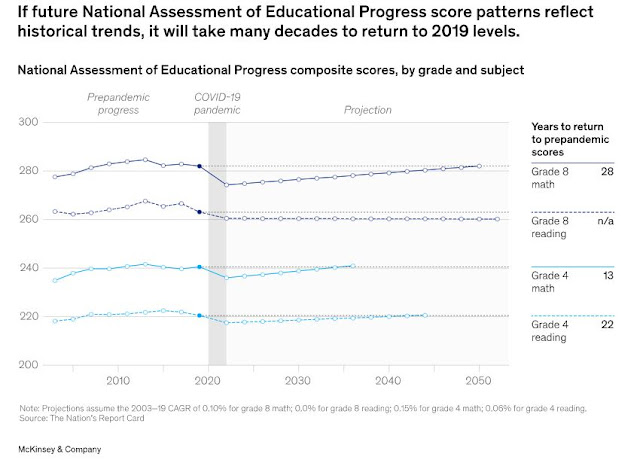Lately, some folks have been online opining about how teachers should be a mysterious black box to their students, not a piece of personal information shared. Mostly, it's in the context of exchanges like this:
In other words, it's okay if teacher gag laws make it necessary for LGBTQ teachers to keep their personal lives a secret, because all teachers should keep their personal lives a secret (not sure what you're supposed to do about being Black in an anti-CRT state).
For the many millions of us in small town and rural school districts, it is an absurd argument.
I taught for almost forty years in a small town/rural district. Taught, in fact, in the same school from which I graduated. I was also, during those years, a church choir director, a newspaper columnist, and an active local theater and music guy. Also, the father of two students who came up through that same system. I do not have the time or space to trace through every line of connection that ties all the folks in this community together. Beyond those ties, you simply meet students everywhere--in church, shopping for groceries, at the 4-H fair, walking down the street, buying underwear, any sort of outing with your family.
In that environment, you share details of your life for a couple of reasons, one being that nature abhors an information vacuum and if your students don't know things, they will either make them up or dig them up elsewhere (e.g. Student to me: "My mom says you were a big weenie in high school"). But also because it is hard for students to get interested in being taught by a robot.
This does not mean that a teacher should regularly spew their guts over the classroom. But there is no reason to stop being a person when you walk into a classroom, and in small town settings, it's hard to avoid it.
Also--and I have to believe this is true no matter how large your district--as a teacher you are often one of the small group of adults that students know, and you cannot avoid modeling how adults navigate the world.
Years ago, in the process of discussing a work, I mentioned that a literary character was probably a hot babe, and one student responded, "Oh, I don't know how Mrs. Greene would feel about that."
There was a brief moment in which some students looked around in mild alarm, and my niece, who was also a student in the class said, "He's divorced." The student who had spoken up absolutely froze.
In that moment, whether I wanted to bring up the subject or not, I was going to show students how an adult could feel about being divorced. Was it something to be proud of, ashamed of? Was it something unmentionable? I was going to model... something, whether I wanted to or not. (FTR, I think I modeled something along the lines of "not shameful, but no point of pride, either, and also not news, so nobody's in trouble for bringing it up.")
The things people will know about you in a small town teacher world is just mind-boggling. They come from the same families that serve your food, chat with you while you're shopping, sit in the next pew, fix your car, and handle your medical care (one of my Small Town Teacher stories is the time I had my first colonoscopy and the tech was a recent student of mine). It evens out a bit, because students will share things with about home that would make their parents' hair curl, but still. The notion that you could keep your personal life a secret is hilarious.
Likewise, in a small town district, your politics may not be a secret at all (Heck, for years, a social studies teacher in my school was also the mayor of the city). Maybe you can keep your political leanings secret, or maybe ever since your picture ran on the front page of the newspaper waving that sign at that rally, your politics will be pretty well known by everybody who cares to pay attention (and it should be noted that not everybody will care to pay attention).
What do you do? You model how intelligent people handle political stances in the adult world. You show that you can treat people with whom you disagree as if they are human beings deserving of respect and decent treatment.
The politics in the classroom debate is getting broader because we have decided that everything is politics. The foundation of our big disagreements about race and LGBTQ issues is a disagreement about what the argument is really about.
For folks on the right, the understanding is that racial issues in this country were all fixed in the mid-sixties and there is no longer anything to complain about, and that LGBTQ orientations are unnatural and therefor the result of either trauma or trickery. Therefor, any discussions about rights or considerations for these groups is simply a political ploy.
For other folks, "Black lives matter" and "LGBTQ persons deserve to exist and be treated decently" are not political statements, but statements about basic humanity.
Are there limits? Sure. Like everything else in education, it's a balancing act. Requiring students to sign on as active crusaders in your cause is not okay (and most often comes across as "You must pretend to believe X in order to get a good grade in this class," which never serves anyone).
Look, if a teacher is going to be a person in the classroom (and I think they should), then I think the appropriate stance is this:
"I am a person, with strengths, weaknesses, biases, opinions, and a variety of life experiences. Some of this may come up in this class, and some may not, but what you need to know as students is that none of it will affect how I treat, teach, or assess you. You will not be picked on or receive a lower grade because you believe X or refuse to believe Y. I will communicate the standards of this class clearly to you, and I guarantee that there are no secret hidden standards that I will use. Whatever you believe or disbelieve, you are safe to be that person in here."
Maybe in a large district you can work in a building where nobody knows anything about you. Maybe you can carefully monitor every word that comes out of your mouth so that you never slip up and drop hints about your life outside of school. Maybe you find a way to never be seen with your family in public. Maybe nothing in your life will ever blow up loudly enough that the echoes make it into your classroom. Maybe you can learn to function as someone who is not actually a full person in your classroom. You sure can't do any of that in a small town district, and imagining trying just makes my head hurt. It's perhaps my own bias and experience speaking, but the whole exercise strikes me as making you a less effective teacher and a very weary human being.











